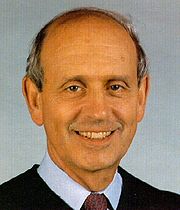
Cedric Kushner Promotions, Ltd. v. King
Encyclopedia
Cedric Kushner Promotions, Ltd. v. King, , was a United States Supreme Court
case decided in 2001. The case concerned the extent to which the Racketeer Influenced and Corrupt Organizations Act
(RICO) applied to certain types of corporation-individual organizations. In this case, the Court decided unanimously to apply it to Respondent
Don King.
 Justice Stephen Breyer
Justice Stephen Breyer
wrote the decision of the Court, which unanimously
reversed the appellate court.
The Court held that "the need for two distinct entities is satisfied; hence, the RICO provision...applies when a corporate employee unlawfully conducts the affairs of the corporation of which he is the sole owner -- whether he conducts those affairs within the scope, or beyond the scope, of corporate authority." "The corporate owner/employee, a natural person, is distinct from the corporation itself, a legally different entity," Justice Breyer wrote. "A corporate employee who conducts the corporation's affairs through an unlawful RICO 'pattern...of activity,' uses that corporation as a 'vehicle' whether he is, or is not, its sole owner."
Under this reading of the statute, the Court of appeals' decision was reached in error; the case was sent back to them for future disposition of the case.
Supreme Court of the United States
The Supreme Court of the United States is the highest court in the United States. It has ultimate appellate jurisdiction over all state and federal courts, and original jurisdiction over a small range of cases...
case decided in 2001. The case concerned the extent to which the Racketeer Influenced and Corrupt Organizations Act
Racketeer Influenced and Corrupt Organizations Act
The Racketeer Influenced and Corrupt Organizations Act, commonly referred to as the RICO Act or simply RICO, is a United States federal law that provides for extended criminal penalties and a civil cause of action for acts performed as part of an ongoing criminal organization...
(RICO) applied to certain types of corporation-individual organizations. In this case, the Court decided unanimously to apply it to Respondent
Respondent
A respondent is a person who is called upon to issue a response to a communication made by another. In legal usage, this specifically refers to the defendant in a legal proceeding commenced by a petition, or to an appellee, or the opposing party, in an appeal of a decision by an initial fact-finder...
Don King.
Background
Cedric Kushner Promotions, Ltd., a corporate promoter of boxing matches, sued Don King, the president and sole shareholder of a rival corporation, alleging that King had conducted his corporation's affairs in violation of the Racketeer Influenced and Corrupt Organizations Act (RICO). RICO makes it "unlawful for any person employed by or associated with any enterprise...to conduct or participate...in the conduct of such enterprise's affairs through a pattern of racketeering activity." The District Court dismissed the complaint. In affirming, the Second Circuit Court of Appeals held that RICO applies only where a plaintiff shows the existence of two separate entities, a "person" and a distinct "enterprise," the affairs of which that "person" improperly conducts. The court concluded that King was part of the corporation, not a "person," distinct from the "enterprise," who allegedly improperly conducted the "enterprise's affairs."Opinion of the Court

Stephen Breyer
Stephen Gerald Breyer is an Associate Justice of the U.S. Supreme Court. Appointed by President Bill Clinton in 1994, and known for his pragmatic approach to constitutional law, Breyer is generally associated with the more liberal side of the Court....
wrote the decision of the Court, which unanimously
Majority opinion
In law, a majority opinion is a judicial opinion agreed to by more than half of the members of a court. A majority opinion sets forth the decision of the court and an explanation of the rationale behind the court's decision....
reversed the appellate court.
The Court held that "the need for two distinct entities is satisfied; hence, the RICO provision...applies when a corporate employee unlawfully conducts the affairs of the corporation of which he is the sole owner -- whether he conducts those affairs within the scope, or beyond the scope, of corporate authority." "The corporate owner/employee, a natural person, is distinct from the corporation itself, a legally different entity," Justice Breyer wrote. "A corporate employee who conducts the corporation's affairs through an unlawful RICO 'pattern...of activity,' uses that corporation as a 'vehicle' whether he is, or is not, its sole owner."
Under this reading of the statute, the Court of appeals' decision was reached in error; the case was sent back to them for future disposition of the case.

